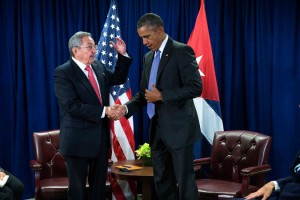The Elephant in the Room
Yesterday, Raúl Castro and President Obama met again for the second time in 6 months. As the tensions between Cuba and the U.S. began to simmer, the door opened for a more cordial relationship. However, although an upward trend, there is still a big elephant in the room: a 53-year-old embargo. Castro says that this embargo is keeping the U.S.-Cuba relationship from returning to “normal”. But what constitutes a normal relationship between states, is there a universal way to interact? No. According to Wendt, collective meanings create the basis for our actions towards others. Cuba has created their reputation through time, building a solid identity in U.S. eyes. It will take time to turn the U.S. view around, but right now this view is on a trending upward.
The article also brings about the question of human rights. Obama spoke up about human rights within Cuba. An outside state instructing another state on their civil liberties could be a first step in sparking change. On the other hand, though, Castro could see this as a challenge against his power and form of leadership. What one country thinks is right could be completely wrong in another’s point of view. When observing other states actions, we must take a relative perspective to see the whole picture, then recognize the openings for change, such as suggesting a basic structure to implement more human rights for the citizens of Cuba.
I think if Cuba starts to recognize its citizen’s civil liberties, the U.S. will finally start to solidify a new image of Cuba. In turn, as the two countries create a more trusting relationship, the embargo could be lifted. This article shows the cyclical relationships among states, similar to I scratch your back, you scratch mine. If one state is willing to make one change, then another state might decide to change as well, hopefully creating a chain reaction of change for the better.
